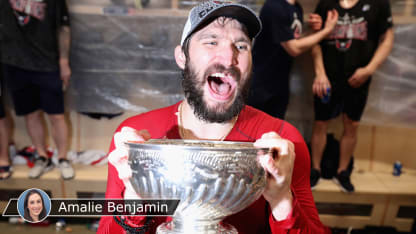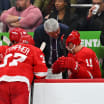LAS VEGAS - It started simply. George McPhee, then the general manager of the Washington Capitals, now the general manager of the Vegas Golden Knights, stepped to the podium at RBC Center in Raleigh, North Carolina, and uttered one sentence that would forever change the story of both team and player: "With the first selection in the 2004 NHL Entry Draft, the Washington Capitals are pleased to select Alexander Ovechkin."
Ovechkin cements legacy by winning Stanley Cup for Capitals
Captain 'evolved' to deliver first championship to Washington

There were hugs. There were cheers. There was the beginning of a story that would take 14 years to write, 14 years of successes and failures, of enormous goal totals and shocking postseason exits, of heartbreak and history.
He was the future of the franchise, the player destined to bring a long-awaited, long-dreamed-of Stanley Cup to the Capitals, a team that had never been a champion. And though he is no longer that young player full of promise, after more than 600 goals and 1,000 games and his 32nd year running out, he is something better. He is a champion. He is a Stanley Cup winner. He is, finally, the player he was always supposed to be.
RELATED: [Complete Golden Knights vs. Capitals series coverage | Capitals Championship Gear]
Alex Ovechkin has erased the disappointing past and become the future that was planned for him, with the ring and the resume and the legend sealed with 16 wins in the Stanley Cup Playoffs, the last coming in Game 5 against the Vegas Golden Knights on Thursday. It was that last win, in which he scored his 15th goal of the playoffs, that earned him the Conn Smythe Trophy as the postseason's most valuable player, the accolades from his peers, and the right to void all the criticism that dogged him for years.
"It means everything," he said.
And that was it. That was all of it, there in three words. All the work and the hunger and the frustration, all the years in which he was questioned and blamed. There was the missing line in his biography, filled in.
This was all that was left.
\\\\
Time and again, the Capitals had done everything they needed to do in the regular season, including winning the Presidents' Trophy in 2016 and 2017. Ovechkin had done everything he needed to do in the regular season, too, with 1,122 points (607 goals, 515 assists) in 1,003 career NHL games.
But that would never be enough, for either team or player. Because though the greatness of Ovechkin's game had long been established, he continued to suffer in comparison to players like three-time Cup winner and Pittsburgh Penguins center Sidney Crosby, players who had cemented their greatness with the ultimate prize.
Ovechkin had been elevated to captain on Jan. 5, 2010, at 24 years old, an honor expected to be quickly followed by a championship of his own. Instead, it would take eight more years. But now Ovechkin stands as the third Europe-born captain, and first NHL captain born in Russia, to hoist the Cup.
"Having been a great goal scorer, winning the scoring race, but not being able to take the next step before this year… I'm sure this is a great relief for him," said Hall of Fame defenseman Nicklas Lidstrom, the first Europe-born captain to win the Cup, with the Detroit Red Wings in 2008. "I'm sure there's great satisfaction as well to take that next step, especially [because] when he became the captain he was looked upon as being a leader on their team. Now he's proven that to everyone."
He has become the leader the Capitals always thought he could be.
He led them past Pittsburgh, past a raft of personal demons, in the Eastern Conference Second Round.
He led them past the Tampa Bay Lightning in his first chance at the Eastern Conference Final.
He led them past the Cinderella story that was Vegas, to capture a moment many Capitals fans, and players, wondered if they would ever see.
"He's been through a lot," Washington forward Brett Connolly said before Game 5. "Obviously a lot of personal success, but a lot of outside noise with everything else. … He gets this done and then he's viewed completely different, for sure. All that stuff goes out the window. You can have a different kind of conversation about him."
Or as forward Devante Smith-Pelly said, "He's one of the greatest players ever, now his legacy is 100 percent cemented."
It was what they expected when they drafted him, when Capitals owner Ted Leonsis told Ovechkin that they were in this together -- that they would win -- before Ovechkin ever stepped on the ice for Washington, a promise that took 14 years to fulfill.
"He deserved this," Leonsis said. "No one worked harder. No one was more loyal. He's a really, really high character, beautiful person. His entire family, the way they've raised him. The integrity that he has. The way he came back this year, so focused to get a Cup. Him and [center Nicklas] Backstrom, no one deserved it more."
\\\\
Ovechkin looked so young then, back when McPhee uttered those words. He hadn't filled out, and his hair had yet to turn gray. Everything was ahead of him, all the promise and the pain, though he would not know it yet. He knows it now.
He knows what it has taken to get here, how his game had to change, how he had to change. It was notable in the past few seasons, when a commitment to defense and blocking shots and an all-around game took root in a way it never had before.
And maybe that was when those close to him could see this coming.
"He's always been really good, but he's grown, I think over the last couple years," said forward Jay Beagle, a teammate for eight seasons. "You can see it. This postseason you could really tell that he is willing to do whatever it takes away from the puck, blocking shots, all those small plays that you don't normally notice."
They noticed. And they said, maybe, finally, this was their moment. They had watched, as defenseman John Carlson put it, as Ovechkin "evolved;" as he started playing "the most complete he's played in his whole career," as Connolly said.
That was cemented last summer when coach Barry Trotz met with Ovechkin in Russia after the player's wedding. The coach pointed out his game would have to change even more, he would have to train differently and work differently after a 2016-17 season when he scored 33 goals after clearing 50 the three previous seasons.
"So what does he do?" Trotz said. "He comes into the start of the season and gets seven goals in [the first] two games. There's guys in this league that can't get seven goals in a year, and he got seven in two games. So he sort of set the bar personally because a lot of things were said about him that I think he is very prideful and he just said, 'You know what? I'm going to prove you all wrong.' And he did."
And so the narrative changes, rearranges itself. It forgets it ever sold Ovechkin short or doubted him or failed to give enough credit to a transcendent talent. He becomes a player who has completed his journey, even if he has years yet to play.
"I'm sure it's relief, it's maybe sort of redemption for him too, to be able to do it after so many years," Lidstrom said. "And just a great joy, finally winning it all."
That much was obvious on Thursday, as he screamed and swore, as he hardly let go of the trophy he had yearned for, as he noted that he had not done it alone. But he had done it.
He had done it.
"It's just huge emotions right now," Ovechkin said. "I don't know how to explain it. It's just something special. I'm just very happy. I'm happy for my teammates. I'm happy for fans, for my family. I know lots of my family passed away and they were with me today. They helped me a lot. It's something special."
Fourteen years after Ovechkin was drafted by the Capitals, 13 seasons into a career that will end in the Hall of Fame, a player who always deserved to raise the Cup got his chance. He changed his story, changed his legacy, changed everything.
It was, in the end, as simple as that.

















